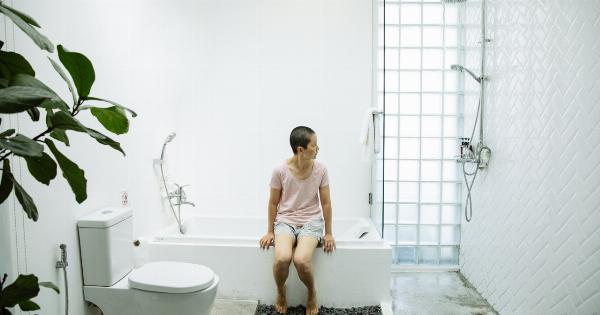Many people start their day by visiting the toilet. It’s a habit that helps to keep the digestive system functioning properly. However, some people may experience difficulties in passing their stool, leading to constipation.
The relationship between morning toilets and constipation is complex. In this article, we will explore how morning toilets affect constipation and what you can do to ensure a healthy digestive system.
What Causes Constipation?
Before we dive into the relationship between morning toilets and constipation, it’s important to understand what causes constipation in the first place. Constipation can happen when bowel movements become infrequent or difficult.
Stool passes through the colon too slowly, causing it to become hard and dry. This can be due to many reasons including:.
- Insufficient water intake
- Inactivity
- A low-fiber diet
- Stress or anxiety
- Ignoring the urge to defecate
- Taking certain medications
- Underlying medical conditions like IBS, hypothyroidism, or Parkinson’s disease.
The symptoms of constipation can vary from person to person. Some common symptoms include:.
- Difficulty in passing stool
- Bloating
- Abdominal pain
- Straining while passing stool
- Feeling of incomplete evacuation
- Less than three bowel movements in a week
How Do Morning Toilets Affect Constipation?
The timing of bowel movements can vary depending on a person’s habits, diet, and lifestyle. A common pattern is to have a bowel movement in the morning after waking up.
This pattern may be influenced by the body’s circadian rhythm, a natural cycle that regulates many of our bodily functions. However, some people may experience difficulties in passing stool in the morning, leading to constipation.
The relationship between morning toilets and constipation is complex. On one hand, having regular bowel movements in the morning can help to prevent constipation. On the other hand, difficulties in passing stool in the morning can lead to constipation.
Here are some possible reasons why:.
Dehydration
When you wake up in the morning, your body may be dehydrated after several hours of sleep. Dehydration can cause the stool to become harder and drier and make it difficult to pass.
Drinking a glass of water first thing in the morning can help to hydrate your body and soften your stool.
Ignoring the Urge to Defecate
If you ignore the urge to defecate in the morning, your stool can become dry and hard, leading to constipation. It’s important to listen to your body and respond to the urge to defecate promptly.
Ignoring the urge to defecate can also lead to other health problems like anal fissures, hemorrhoids, and diverticulitis.
Low-Fiber Diet
A low-fiber diet can cause constipation. Fiber helps to bulk up the stool and promote bowel movements. If you eat a diet that is low in fiber, your stool may become small and dry, making it difficult to pass.
Including fiber-rich foods like fruits, vegetables, whole grains, and legumes in your diet can help to prevent constipation.
Inactivity
Inactivity and a sedentary lifestyle can cause constipation. When you are inactive, your intestinal muscles become weak, and the stool moves slowly through the colon. Regular exercise can help to stimulate bowel movements and prevent constipation.
Medications
Some medications can cause constipation as a side effect. These include pain medications like opioids, antidepressants, antacids, and iron supplements.
If you are experiencing constipation, consult your doctor to find out if your medications may be responsible.
: How to Prevent Constipation
Preventing constipation requires a holistic approach that includes changes in lifestyle habits and dietary changes. Here are some things you can do to prevent constipation:.
: Hydrate Your Body
Drinking enough water and other fluids can help to hydrate your body and soften your stool. Aim to drink at least 8-10 glasses of water or other fluids daily.
: Eat a High-Fiber Diet
Eating a diet that is rich in fiber can help to promote bowel movements and prevent constipation. Include plenty of fruits, vegetables, whole grains, and legumes in your diet.
Exercise Regularly
Regular exercise helps to stimulate bowel movements and promote a healthy digestive system. Aim for at least 30 minutes of moderate-intensity exercise, such as brisk walking, jogging, swimming, or biking, most days of the week.
: Respond to the Urge to Defecate Promptly
Ignoring the urge to defecate can lead to constipation. Respond to the urge to defecate promptly to prevent constipation and other digestive problems.
: Limit Intake of Foods and Beverages that Can Cause Constipation
Foods and beverages like dairy products, processed foods, fried foods, alcohol, and caffeinated drinks can cause constipation. Limit your intake of these foods and beverages to prevent constipation.
: Avoid Laxative Abuse
Laxatives can cause dependence and lead to more severe constipation. Use laxatives only under the guidance of a healthcare professional.
: Manage Stress
Stress can cause constipation. Practice stress management techniques like meditation, yoga, or deep breathing to manage stress and promote a healthy digestive system.
: Conclusion
Morning toilets are an important part of keeping the digestive system functioning properly. However, difficulties in passing stool in the morning can lead to constipation.
It’s essential to understand the relationship between morning toilets and constipation and take steps to prevent constipation naturally. By making dietary changes, lifestyle changes, and responding promptly to the urge to defecate, you can maintain a healthy digestive system.






























